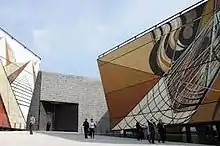Frida Escobedo
Frida Escobedo (born 1979) is a Mexican architect. She specifically designs and restores urban spaces: housing, community centers, art venues, and hotels.[1] When creating, Escobedo illustrates her works within a general theme of time, but not in a historical context but rather in a social context.[2] She founded her own architectural and Design Studio in 2006 which is currently located in Mexico City.[2] Escobedo is known for creating temporary and interactive works which can accommodate multiple intended purposes.
Frida Escobedo | |
|---|---|
 | |
| Born | 1979 (age 41–42) Mexico City, Mexico |
| Nationality | Mexican |
| Alma mater | Universidad Iberoamericana |
| Occupation | Architect |
| Buildings | La Tallera |
In 2018, she became the youngest architect to work on the Serpentine Pavilion.[3] Her architectural work includes projects such as the courtyard at La Tallera in Cuernavaca,[4] while her artistic undertakings can be seen in places such as the Museo Experimental el Eco in the Mexico City or the Victoria & Albert Museum in London.[5][6][7][8][9] Escobedo was named one of the top 30 most influential architects in London by archdaily.com because of her work on the Serpentine Pavilion.[4]
Biography
Escobedo studied architecture at the Universidad Iberoamericana and received a master's degree in Art, Design and the Public Domain at Harvard‘s Graduate School of Design.[8] Since 2007 she has been teaching at the Universidad Iberoamericana. She has participated as a judge for the Harvard Graduate School of Design, Boston Architectural College and the Monterrey Institute of Technology in Mexico. Escobedo has taught classes at Columbia University’s Graduate School of Architecture, Planning, and Preservation, Harvard Graduate School of Design, and the Architectural Association School of Architecture in London.[2]
Early years
As a child Escobedo accompanied her father to the hospital where he worked as a doctor. The hospital is where she spent her time staring out the window at near by housing complexes. In an Interview with Architectural Digest, Escobedo says she was "trying to understand how space reflects people’s personalities,” by looking out the window. She reveals later in the interview that people's emotions and relationships are revealed by building's design.[10]
Casa Negra
In 2003, with Alejandro Alarcón, she founded the "Perro Rojo" studio, whose one of the most recognized works is "Casa Negra", which was designed in complete freedom by a person who wished to live surrounded by nature. The block structure is mounted on four tubes and lifted above the earth, and the rooms are located inside this structure. The design was finished with a large window to create total visibility of the City of Mexico, evoking the sensation of being behind a large camera.[11]
Pavilion at the Museo Experimental el Eco
In 2010, her installation at the Museo Experimental el Eco featured moveable cement slabs intended to accommodate lectures and speakers.[1]
Plaza Cívica, Lisbon and Victoria & Albert Museum
In 2013 she created a circular arena and in 2015 designed a series of mirrored complexes in the courtyard of the Victoria and Albert Museum. When creating, Escobedo illustrates her works within a general theme of time, but not in a historical context but rather in a social context.[12]
Serpentine Pavilion
In 2018 Escobedo designed the Serpentine Pavilion for the London's Kensington Gardens. In her design she used materials and architectural styles from both Britain and Mexico in order to create a work that would capture the historical and cultural aspects of each country. The exhibit was open to the public from June 15 to October 7, 2018. The design of the Pavilion is an allusion to courtyards typically attached to houses in Mexico.[13] The structure featured latticed walls of British made cement which allow both light and wind to pass through; the open, yet enclosed structure Escobedo designed is intended to create an illusion of secrecy.[1] She also makes use of a small pool and a mirrored ceiling which creates a contrast between light and shadow that changes throughout the day as the sun moves angles, the shadows that shift resembles the passage of the day.[1]
Works
- 2003 – Casa Negra (in collaboration with Alejandro Alarcón), Mexico City
 Siqueiros' La Tallera.
Siqueiros' La Tallera. - 2006 – Restoration at the Hotel Boca Chica (in collaboration with José Rojas), Acapulco, Mexico
- 2008 – Project by Ordos 100
- 2010 – Pavilion at the Museo Experimental el Eco, Mexico City
- 2012 – Restoration de La Tallera, Cuernavaca
- 2013 – Plaza Cívica, Lisbon
- 2015 – Installation at the Victoria & Albert Museum
- 2017 - Exhibition at Arthur Ross Architecture Gallery, Columbia University, New York [14]
- 2018 - Serpentine Pavilion 2018 [15]
Awards and prizes
- 2004 – Young Creators' Scholarship from the Fondo Nacional para la Cultura y las Artes, Mexico
- 2009 – Winner of the Young Architects Forum, part of Architectural Association of New York.
- 2010 – Marcelo Zambrano Scholarship
- 2013 – Nominated for Arc Vision Prize for Women
- 2012 – Her work was featured at the Venice Biennale of Architecture, at the Mission Cultural Center for the Latino Arts in San Francisco, and at Storefront for Art and Architecture.
- 2012 – Finalist for the programme Rolex Mentor and Protégé Arts Initiative.
- 2016 – Emerging Architecture Award, Architectural Review[16]
References
- "Frida Escobedo builds Serpentine Pavilion featuring "woven tapestry" of concrete tiles". Dezeen. 11 June 2018. Retrieved 13 November 2018.
- "Frida Escobedo – Chicago Architecture Biennial". chicagoarchitecturebiennial.org. Retrieved 13 November 2018.
- "Mexican Architect Frida Escobedo Selected to Design 2018 Serpentine Pavilion". archdaily.com.
- Walsh, Niall. "The 30 Most Influential Architects in London". arch daily.
- "Seven key projects by Serpentine Pavilion architect Frida Escobedo". Dezeen. 11 June 2018. Retrieved 4 December 2018.
- "SOBRE". fridaescobedo.net. Archived from the original on 23 October 2018. Retrieved 9 February 2018.
- "SOMA MEXICO – Frida Escobedo". somamexico.org.
- "Liga 06 | LIGA". liga-df.com. Archived from the original on 12 June 2018. Retrieved 9 February 2018.
- "Profile: Frida Escobedo – Icon Magazine". www.iconeye.com.
- "Inside front cover". CrystEngComm. 18 (44): 8520. 2016. doi:10.1039/c6ce90182d. ISSN 1466-8033.
- Arana López, Gladys| architect. "Frida Escobedo 1979".
- "Frida Escobedo, Designer of the Serpentine Pavilion, Among 2019 RIBA International Fellows". ArchDaily. 7 November 2018. Retrieved 13 November 2018.
- "Look inside Frida Escobedo's Serpentine Pavilion in 360-degree video". Dezeen. 11 June 2018. Retrieved 13 November 2018.
- https://www.arch.columbia.edu/exhibitions/63-no-9-an-exhibition-by-frida-escobedo%7Ctitle=No. 9
- http://www.serpentinegalleries.org/files/press-releases/pavilion_2018_press_pack_final.pdf
- "La mexicana Frida Escobedo gana el premio de Arquitectura Emergente 2016 web".
External links
| Wikimedia Commons has media related to Frida Escobedo. |